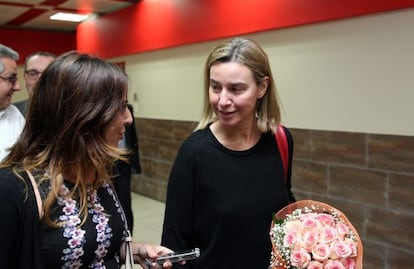EU foreign affairs chief steps up talks for new Cuba cooperation policy
High representative will meet with Cuban officials and members of society

The European Union wants to establish closer ties with Cuba now that the United States has begun talks aimed at restoring diplomatic relations with the communist Caribbean island.
Federica Mogherini, the European Union’s High Representative for Foreign Affairs and Security Policy, arrived on Monday in Havana for a two-day visit in which she was expected to meet with members of Raúl Castro’s government and top representatives of society.
This is the first visit of an EU high representative to Cuba.
Mogherini is the first EU high representative to make a visit to Cuba
“The European Union is an important partner for Cuba and we must play an active role,” Mogherini told EL PAÍS and another European newspaper also covering her visit.
Together, the 28 nations that form the EU bloc are Cuba’s biggest investors, followed by Venezuela. Nineteen European nations hold separate bilateral treaties with Havana, and two-thirds of all visitors to Cuba come from Europe.
Yet this peculiar economic relationship has contradicted European policy in the past. For 17 years, the EU had adopted a “Common Position Policy” based on a proposal presented by former Spanish Prime Minister José María Aznar aimed at encouraging more democratic freedoms on the Caribbean island.
But that stance didn’t work and member nations more than a year ago decided to begin negotiations for a political cooperation agreement. Discussions were initiated but they were going at a slow pace.
“The political priority is to advance more rapidly and push for international cooperation,” said Mogherini.
The first round of talks took place on March 4 and 5 in Havana. The Europeans were able to make some headway but also encountered obstacles in certain areas, including issues regarding society’s role in Cuba and the Cuban government’s international obligations, according to an EU press release.
Castro had personally invited Mogherini to visit Havana before the next round of talks are scheduled to begin in the summer.
She will meet with various Cuban officials, including Foreign Minister Bruno Rodríguez, economy chief Marino Murillo and foreign trade director Rodrigo Malmierca. She will also hold talks with National Assembly speaker Esteban Lazo and Catholic Cardinal Jaime Ortega.
Human rights had been a sticking point that almost blocked the EU’s decision to open talks with Havana
Mogherini, however, did not want to release any details or the names of the civil society representatives who will meet with her.
Human rights had been the sticking point that blocked the European Union’s decision to open talks with Havana. Poland, Czech Republic and Germany had taken a tough stance in changing the long-standing Common Position Policy but agreed to seeking a newer direction as long as attention was still focused on rights issues.
Mogherini is not the only European official anxious to broaden ties with Cuba. In the past year, the foreign ministers of Spain, Italy, Netherlands, France and Britain visited Havana. French President François Hollande has also scheduled a trip in May.
One key issue that Mogherini is expected to tackle with Cuban officials is the crisis in Venezuela and the political and economic deterioration taking place in the country. She has also expressed interest in the ongoing peace talks in Havana between the Colombian government and the Revolutionary Armed Forces of Colombia (FARC).
Tu suscripción se está usando en otro dispositivo
¿Quieres añadir otro usuario a tu suscripción?
Si continúas leyendo en este dispositivo, no se podrá leer en el otro.
FlechaTu suscripción se está usando en otro dispositivo y solo puedes acceder a EL PAÍS desde un dispositivo a la vez.
Si quieres compartir tu cuenta, cambia tu suscripción a la modalidad Premium, así podrás añadir otro usuario. Cada uno accederá con su propia cuenta de email, lo que os permitirá personalizar vuestra experiencia en EL PAÍS.
¿Tienes una suscripción de empresa? Accede aquí para contratar más cuentas.
En el caso de no saber quién está usando tu cuenta, te recomendamos cambiar tu contraseña aquí.
Si decides continuar compartiendo tu cuenta, este mensaje se mostrará en tu dispositivo y en el de la otra persona que está usando tu cuenta de forma indefinida, afectando a tu experiencia de lectura. Puedes consultar aquí los términos y condiciones de la suscripción digital.









































